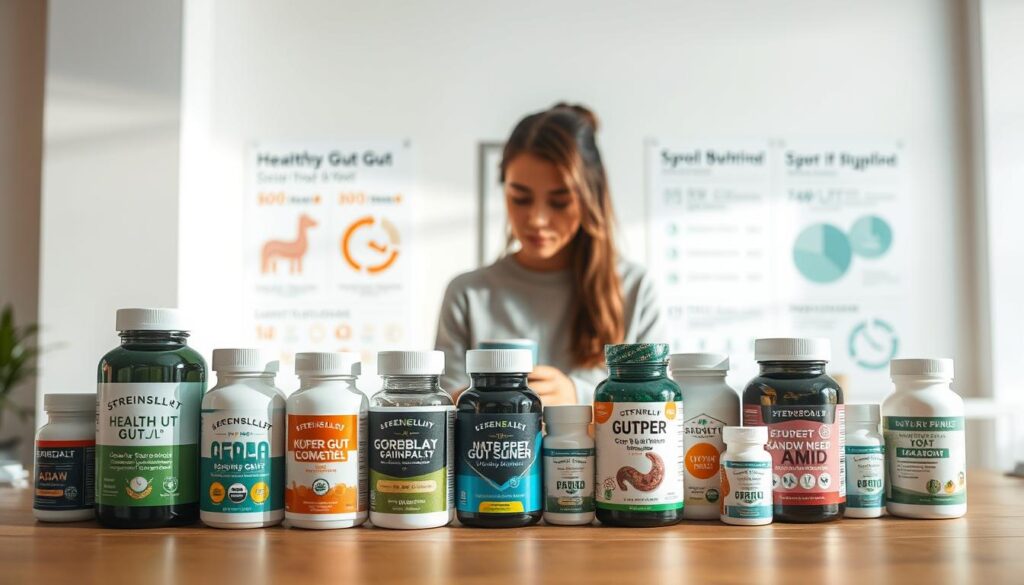Gut health is key to feeling good overall. In 2025, more people are focusing on healthy gut supplements. These help with digestion and boost immunity. This guide will help you pick the right supplements for your needs.
Healthy gut supplements vary. You can find everything from probiotics to prebiotics. Each one targets different needs. Learn which ones are scientifically proven to improve your gut health.
Key Takeaways
- Healthy gut supplements can reduce common digestive discomforts.
- Probiotics, prebiotics, and synbiotics work differently to boost gut balance.
- Look for research-backed ingredients like Lactobacillus and Bifidobacterium.
- Shelf-stable options make it easier to maintain a consistent routine.
- Consult a doctor before starting supplements for personalized advice.
Understanding the Importance of Gut Health
Your healthy gut is the base of good health. Inside your digestive system, a complex world of bacteria and fungi lives. This world, called the gut microbiome, is key for digestion, fighting off sickness, and even our mood.
The Gut Microbiome Explained
Think of your gut as a busy city. Good bacteria like Bifidobacterium and Lactobacillus live there, helping break down food and fighting off bad guys. But if this balance gets upset, you might feel sick or uncomfortable. That’s where probiotics and prebiotics come in, helping keep things in check.
How Gut Health Affects Overall Wellness
- Immune system support: 70% of immune cells live in the gut lining.
- Mental clarity: The gut and brain are connected, affecting mood and stress.
- Metabolism regulation: Gut bacteria help process nutrients and manage energy.
Signs of an Unhealthy Gut
Look out for these common signs:
- Bloating or gas after eating
- Irregular bowel movements
- Frequent sugar cravings
- Skin problems like eczema or acne
- Chronic fatigue or brain fog
These symptoms mean your gut might be out of balance. While diet is important, knowing these signs can help you choose the right supplements for better health.
What Are Healthy Gut Supplements?
Healthy gut supplements help keep your digestive system in top shape. They add good bacteria, help with digestion, and fix the gut lining. These gutsupplements come in four main types:

- Probiotics: Live bacteria like Lactobacillus and Bifidobacterium that live in your gut.
- Prebiotics: Fiber-rich compounds (e.g., inulin, FOS) that feed the good bacteria.
- Digestive enzymes: Proteins like amylase and lipase that break down food for better nutrient absorption.
- Healing agents: Compounds like L-glutamine and slippery elm that fix the intestinal walls.
Together, they help balance gut microbes, lower inflammation, and improve digestion. Look for healthy gut supplements with strains that have been studied in humans. For example:
| Type | Action | Example Ingredients |
|---|---|---|
| Probiotics | Colonize gut lining | Lactobacillus acidophilus |
| Prebiotics | Fuel beneficial bacteria | Chicory root fiber |
| Enzymes | Break down carbohydrates/fats | Bromelain, papain |
Quality gutsupplements should be tested by third parties for purity and strength. Always pick formulas that have been tested in human studies. This ensures they work as promised.
The Science Behind Effective Gut Supplements
Healthygutsupplements are backed by science to improve gut health. Let’s explore what makes some products better for our health.
Research-Backed Ingredients
Top supplements feature strains with solid scientific support. Key players include:
- Lactobacillus acidophilus: Supports immune function and lactose digestion.
- Bifidobacterium longum: Promotes intestinal barrier integrity.
- Saccharomyces boulardii: Shown to reduce diarrhea and inflammation.
How Gut Supplements Support Digestive Balance
Probiotics outnumber harmful bacteria. Prebiotics like inulin and FOS feed good microbes. Amino acids, such as L-glutamine, repair gut damage from stress or bad diet.
This combination creates a barrier for better nutrient absorption and less inflammation.
Bioavailability and Absorption Factors
Not all supplements work the same. Delivery methods play a big role:
| Method | Purpose | Example |
|---|---|---|
| Delayed-release capsules | Protects strains from stomach acid | Enteric-coated probiotics |
| Time-release formulas | Ensures gradual distribution in intestines | Multi-layered capsules |
Choose products with these technologies. They help ensure active ingredients reach the gut alive and intact.
Top Probiotic Supplements for Optimal Gut Health
Choosing the right probiotic is key to supporting your gut microbiome. Here’s a breakdown of what matters most when selecting healthy gut supplements that deliver real results.

Multi-Strain vs. Single-Strain Formulas
Multi-strain formulas like Culturelle Probiotics and Garden of Life Dr. Formulated provide broad support for general balance. Single-strain options such as Align Bifidus target specific issues like bloating. Look for strains like Lactobacillus acidophilus and Bifidobacterium lactis in blends.
- Multi-strain: Better for maintenance and diversity
- Single-strain: Ideal for addressing acute symptoms
CFU Count: What’s Optimal?
More isn’t always better. Maintenance needs often fall between 15–30 billion CFUs, while therapeutic use may require 50+ billion. For daily use, Hyperbiotics PRO-15 (25 billion CFUs) offers balanced support without overcomplicating your routine.
Shelf-Stable vs. Refrigerated Options
Modern preservation tech makes shelf-stable gutsupplements like Renew Life Ultimate Flora just as effective as refrigerated options. Refrigerated brands like Now Foods Probiotic-1030 may offer higher viability for sensitive systems.
| Brand | Type | Strains | CFU | Storage | Best For |
|---|---|---|---|---|---|
| Culturelle | Single-strain | L. casei | 3 billion | Shelf-stable | Occasional digestive issues |
| Hyperbiotics PRO-15 | Multi-strain | 15 strains | 25 billion | Shelf-stable | Everyday maintenance |
| Now Foods Probiotic-1030 | Multi-strain | 30+ strains | 100 billion | Refrigerated | Post-antibiotic recovery |
Prebiotic Supplements: Feeding Your Microbiome
Prebiotics are like fertilizer for your healthy gut. They feed the good bacteria, helping them grow. Think of them as the “food” for probiotics. The best healthygutsupplements have prebiotic blends to increase microbiome diversity.
- Inulin: Found in chicory root, supports bifidobacteria growth
- FOS (fructooligosaccharides): Enhances calcium absorption
- GOS (galactooligosaccharides): Reduces gut inflammation
- XOS (xylooligosaccharides): Promotes diverse microbial communities
- Resistant starch: Improves blood sugar control and satiety
Top choices include chicory root extract powders, baobab powder, or green banana flour blends. Start with 3-5g daily, increasing slowly to avoid bloating. Take with meals for optimal absorption. Choose unflavored, unprocessed options to avoid added sugars.
“Prebiotics and probiotics work like partners in a dance,” says digestive health researcher Dr. Lena Torres. “They create a balanced ecosystem for your gut.”
Quality is key: avoid supplements with fillers. Pair prebiotics with probiotics for better support. Your microbiome’s health depends on consistent nourishment—start fueling it today.
Best Combination Supplements: Synbiotics for Complete Gut Support
Synbiotics are a new level in healthy gut supplements. They mix probiotics and prebiotics into one. This mix helps good bacteria grow, making digestion and immunity better. It feeds probiotics, creating a healthy gut environment.

- Renew Life Ultimate Flora Synbiotic combines 25 billion CFUs with inulin prebiotic fiber
- Garden of Life Dr. Formulated Synbiotic pairs 20 probiotic strains with acacia fiber and ginger extract
- Align Probiotic+Prebiotic Complex includes FOS prebiotics alongside Bifidobacterium lactis
Why Synbiotics Work Better
These blends beat single supplements. Probiotics live longer with their food, colonizing better. A 2023 Nutrients review showed synbiotics cut IBS symptoms in half faster than probiotics alone. They also:
- Boost nutrient absorption
- Lessen bloating and discomfort
- Help with metabolic health
“Synbiotics’ dual action addresses gut imbalance at its root, making them ideal for long-term health maintenance.” —Dr. Emily Carter, Gastroenterology Research Institute
When picking, look for formulas with studied strains like Lactobacillus acidophilus and FOS. Choose products with specific strain counts and third-party tests. Go for blends with digestive enzymes or L-glutamine for gut repair.
Specialized Healthy Gut Supplements for Specific Conditions
Not all gut health issues are the same. For those dealing with IBS or leaky gut, healthygutsupplements made for these problems can help a lot. These special formulas tackle the main causes, not just the symptoms.
IBS-Specific Formulations
Probiotics like Bifidobacterium infantis 35624 (in Align®) and Lactobacillus plantarum 299v (in some Culturelle® products) help with IBS. Look for ones that are low in FODMAPs to avoid making symptoms worse.
- Bifidobacterium infantis 35624: Reduces bloating and abdominal pain
- Lactobacillus plantarum 299v: Eases constipation-predominant IBS
Leaky Gut Support Products
Leaky gut needs nutrients to fix the gut lining. Supplements with L-glutamine (for gut cells) and zinc carnosine (for repair) are important. Collagen peptides (like Genuine Health’s) also help strengthen the gut.
Anti-Inflammatory Gut Supplements
Chronic gut inflammation can be helped by curcumin (turmeric’s active part) and omega-3s. Quercetin, a plant flavonoid, works well with probiotics like Saccharomyces boulardii to fight inflammation.
How long it takes to see results varies—usually 4–8 weeks. Always use supplements with diet changes and doctor advice.
Natural vs. Synthetic Gut Health Solutions
Are you deciding between natural and synthetic gut health options? Both have their benefits. Natural gutsupplements like fermented foods and botanicals offer more than just probiotics. They come from traditions like Ayurvedic and Korean cuisine.
Brands like Body Kitchen sell bone broth powders, and Gaia Herbs offers triphala extracts. But, natural products can vary in strength and may have allergens like dairy in kefir.

Synthetic gutsupplements provide exact amounts and are easy to use. Culturelle and NOW Foods make products with specific strains and inulin prebiotics. They ensure consistent counts but might not have the variety of whole foods.
Some synthetic options include additives or artificial stabilizers.
- Natural pros: nutrient diversity, traditional use
- Synthetic pros: standardized efficacy, shelf stability
- Natural cons: potency fluctuations, potential allergens
- Synthetic cons: possible additives, narrower scope
Think about what you want: the complexity of nature or the precision of labs? Mix both for flexible healthy gut support. For example, drink kombucha daily and take a probiotic capsule when traveling. Always check labels and talk to healthcare providers for the best choices.
How to Choose the Right Healthy Gut Supplements for Your Needs
Choosing the right healthy gut supplements starts with knowing your body’s needs. Use this guide to navigate options confidently.

Assessing Your Gut Health Status
Start by identifying your gut’s needs. Take this quick self-assessment:
- Bloating after meals? Look for probiotics with Bifidobacterium strains.
- Chronic constipation? Opt for fiber-rich prebiotics like inulin.
- Immune struggles? Try blends with Saccharomyces boulardii.
At-home stool tests (e.g., Viome, Thryve) or professional breath tests can pinpoint issues like SIBO or dysbiosis.
Considering Dietary Restrictions and Allergies
Many brands offer allergen-free options. Use this guide:
| Allergen | Look For | Safe Options |
|---|---|---|
| Dairy | “Dairy-Free” | Coconut water kefir, vegan probiotics |
| Soy | “Non-GMO” | Chickpea fiber, sunflower lecithin |
| Gluten | “Certified Gluten-Free” | Rice bran, potato starch prebiotics |
Consulting Healthcare Professionals
Always consult experts for complex cases. Ask these key questions:
- “Does this interact with my medications?”
- “Should I test for nutrient deficiencies first?”
- “What’s the best dosing for my health goals?”
Work with practitioners using evidence-based practices like those from the International Probiotics Association.
Conclusion: Transforming Your Health Through Gut Support
Your gut’s health affects your energy, immunity, and mood. The right healthygutsupplements can help balance your gut. But, making the right choice is key.
First, figure out what’s wrong with your gut. Use at-home tests or see a doctor. Then, pick supplements like probiotics or synbiotics that fit your needs. Look for brands like Garden of Life or RenewLife to ensure quality.
Stick to your supplement plan for 4–12 weeks to notice changes. Don’t overdo it with CFU counts or ignore diet changes. Your gut needs consistency.
New research on probiotics and fermented foods is exciting. But, today’s science-backed options are already effective. Add fiber-rich foods, manage stress, and get enough sleep for the best results.
Don’t wait to start. Small steps, like a daily probiotic or prebiotic, add up. Try Align Probiotic or Culturelle for their focus on bioavailability and specific strains. Your gut’s health is in your hands. Start today with the right healthy gut supplements and see how balanced digestion boosts your life.





